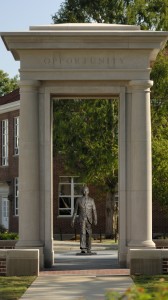OXFORD, Miss. – The University of Mississippi’s Sarah Isom Center for Women and Gender Studies is offering a new emphasis in sexuality beginning this fall semester.
The new field of study will allow students to study sexuality in an open and engaging academic environment. Sexuality studies explore the social construction of sexuality, ways in which society shapes and determines its meanings, as well as the differences that exist within various cultures and moments in history.
The curriculum will feature two courses in the emphasis each semester, including a new course in queer theory and a course on Oscar Wilde this fall. The new program grew out of faculty concerns that the university needed a safe space for educational discussions about sexuality, said Jaime Harker, interim director of the Isom Center.
“It became clear that students needed more opportunities to be educated about issues of sexuality,” Harker said. “As faculty, we decided that setting up an academic program, where students could learn and ask questions in a structured environment, was one way to address this larger need for education.”
UM is the first in the state to offer the sexuality emphasis through a gender studies minor. However, a number of universities across the country have already incorporated programs in sexuality/queer studies, including Indiana University, New York University, and the universities of Florida, Maryland and Ohio.
“This new sexuality emphasis through the gender studies program at Ole Miss reflects the university’s commitment to undergraduate education built on inclusion, a perspective that embraces the complexities and diversity of human experience,” said Jaime Cantrell, a visiting assistant professor of English who will teach the queer theory course cross-listed with the Department of English and the Isom Center.
The term “queer” has historically been used in a number of ways, meaning things ranging from the strange to pejorative, Cantrell said. However, though her teaching, she is far more interested in providing an introduction to what queer theories do than defining what queer theory is.
“Certainly it suggests an anti-normative positioning in terms of sexuality, but someone who is heterosexual might also identify as queer with regard to their particular sexual preferences or pleasures,” she said. “Queer is an inclusive, fluid label that allows individuals to acknowledge that anti-normative positionality without necessarily revealing how or in what contexts.”
Harker hopes that the addition of these courses will begin a needed dialogue.
“We hope to continue to offer new and interesting courses such as the ‘South and Sexuality’ course in the spring,” Harker said. “We need to learn how to discuss sensitive topics in an unemotional, factual manner. The more institutional support this program has, the more it becomes a part of the fabric of our university.”
The Isom Center, named after the university’s first female faculty member, was established in 1981 to address the changing roles and expectations of women students, faculty and staff. The center is responsible for integrating scholarly research on women’s and gender issues.
